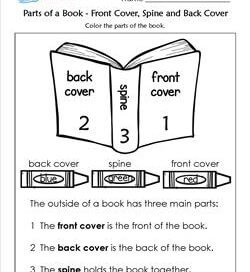
Parts of a Book – Front Cover, Spine, and Back Cover
The front cover, the back cover, and the spine are all on the outside of the book. This worksheet illustrates those three parts and labels them. Kids can color the book.
The parts of a book are just as important as the book itself. We often teach kids from books without thinking about the parts of the book we are teaching them from. Take some time to teach your kids these important concepts. The main points covered in these resources are the front cover, back cover, spine, the pages, how to turn the pages of a book, the title page, title, picture (or illustration) and a few page about authors and illustrators. You will also find two sets of Parts of a Book Posters – one in rainbow polka dot colors and one with a simple black frame. There are also two sets of vocabulary cards – one with the words only and one with images. These pages, vocabulary cards and posters were meant to supplement your oral teaching and visual modeling of of these book parts.
16 worksheets, 2 sets of vocabulary cards, 2 sets of posters
CCSS RF.K.1 & RL.K.6
Go to this page for more print awareness worksheets and resources.

The front cover, the back cover, and the spine are all on the outside of the book. This worksheet illustrates those three parts and labels them. Kids can color the book.
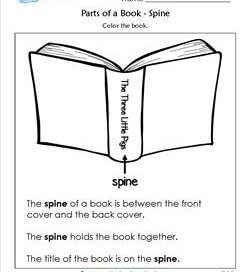
The spine is the part that holds the book together. The title is on the spine. This is a simple informational worksheet about the spine of a book.
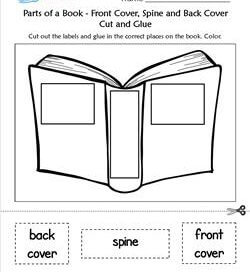
This worksheet repeats what kids have learned so far about the book parts. Now they get to do a hands on cut and glue to show they know what they’ve learned.
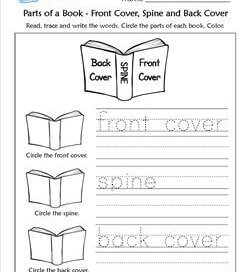
This worksheet reinforces that previous one in that kids get to practice the vocabulary of the words you just taught them. Kids can trace and write the book parts and then they can identify them by circling them.
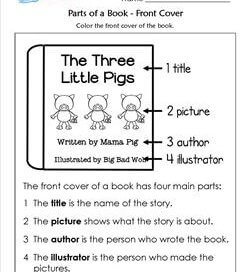
The front cover is the place to start when teaching kids about books. It’s the title and the illustration that first catch our eyes and make us want to read the inside. Here’s a great worksheet showing kids the things they’ll find on the front cover.
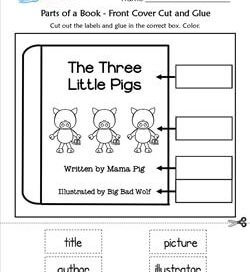
This worksheet is specifically about the front cover of a book. Kids cut & glue the words “title”, “author”, “picture”, & “illustrator” in the spaces.
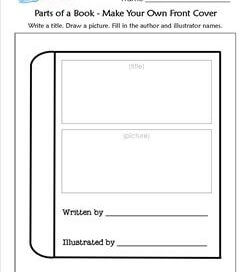
Kids should learn all about books early on. One of the first parts they learn is the front cover and all the things that go on it. Here kids get to use their imaginations and make their own front cover.
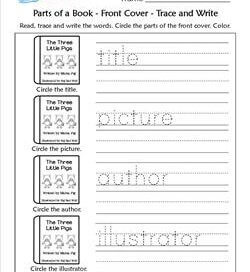
This worksheet reinforces what you’ve taught kids is on the front cover of a book – the title, the picture, the author’s name and the illustrator’s name. On this worksheet kids get to trace the new vocabulary words they’ve learned.
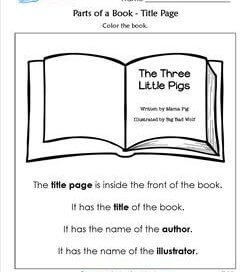
Kids learn several book parts from a young age. A title page is one of them. This worksheet shows kids what’s on a title page – the title of the book, the author and the illustrator’s names.
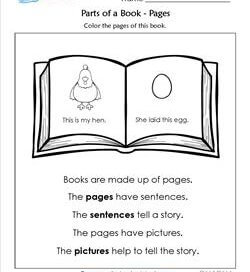
Don’t forget to teach your kids about the pages – this is where all the action happens, the suspense unfolds, and the story comes to a close. The vocabulary words emphasized are pages, sentences, and pictures.
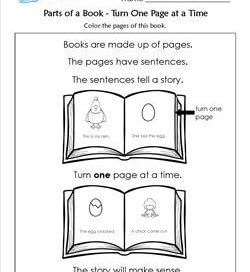
Kids learn how to hold a book correctly and how to turn the pages. This worksheet shows what happens when you turn one page at a time. The story makes sense like it’s supposed to!
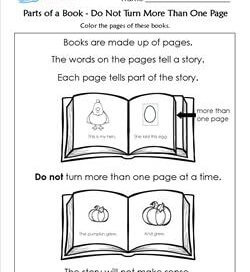
When kids learn about books, they learn that a book is made up of pages. If they turn more than one page at a time the story (or information presented in the book) doesn’t make sense!
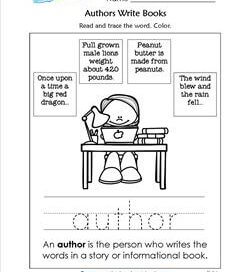
Authors write books – that’s the topic of this worksheet! Read the sentence, trace the word “author”, and color the picture of the author hard at work.
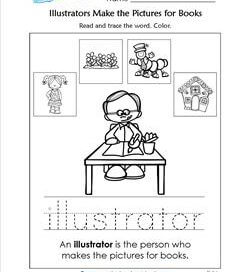
Illustrators make pictures – that’s what this worksheet is all about. Read the page, kids trace the word “illustrator”, and color the picture of the illustrator.
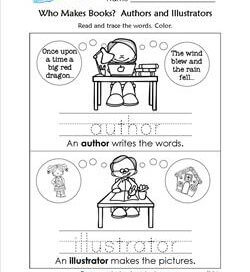
Who makes books? Authors and illustrators! If you didn’t have them you wouldn’t have a book. Read the text with your kids. Have them trace the words and color the pictures of an author and illustrator hard at work.
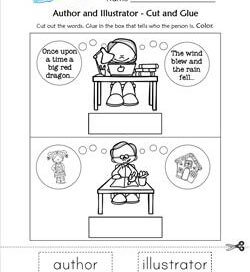
Author and illustrator differences are noted in this cut and glue worksheet. Kids cut out the words “author” and “illustrator” and match the words to the pictures.